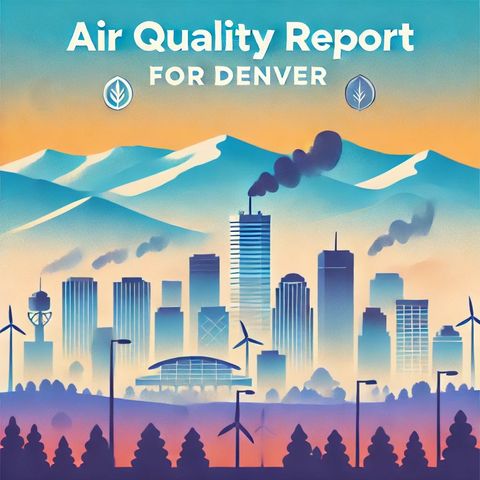Denver's Air Quality Influenced by Population Growth, Traffic, and Weather Conditions

Download and listen anywhere
Download your favorite episodes and enjoy them, wherever you are! Sign up or log in now to access offline listening.
Description
I'm unable to browse the internet in real-time or provide specific data from today. However, I can offer a general guide on the topic of air quality in Denver, Colorado,...
show moreDenver, often known as the Mile High City, is subject to a range of factors that affect its air quality. Geographically, Denver is situated in a basin that can trap air pollutants, particularly during weather conditions known as temperature inversions. This happens when a layer of warm air settles over cooler air at ground level, effectively trapping pollutants and preventing them from dispersing.
Denver's air quality can be influenced by several key factors including population growth, traffic congestion, industrial activities, and geographical features. Vehicle emissions are a significant contributor to air pollution in urban areas, and Denver is no exception. The city's growing population and the corresponding rise in vehicles on the road contribute to elevated levels of pollutants such as nitrogen dioxide and particulate matter.
The industrial sector in and around Denver also plays a role, as emissions from factories and power plants can add to the concentration of pollutants. Previously, Denver had issues with sulfur dioxide and ozone levels, but regulations and cleaner technologies have helped mitigate some of these problems.
Weather also plays a crucial part in daily air quality. For instance, during the summer months, hot temperatures can facilitate the formation of ground-level ozone, a harmful pollutant. Additionally, wildfires, which have become more frequent in the western United States, can compromise air quality significantly. Smoke from wildfires can travel vast distances, affecting air quality in Denver and other parts of Colorado.
The Colorado Department of Public Health and Environment and the Environmental Protection Agency monitor air quality through the Air Quality Index (AQI), which provides daily updates on the status of air pollution levels. The AQI scale ranges from 0 to 500, where lower values suggest good air quality and higher values indicate worsening conditions, which can pose health risks.
Despite some challenges, Denver has made strides in improving its air quality. Initiatives include promoting public transportation, encouraging electric vehicle usage, and adopting stricter emission standards for industries.
For residents and visitors, staying informed about daily air quality is vital, particularly for those with respiratory issues, the elderly, and children who are more vulnerable to pollution. By consulting resources like real-time air quality maps or local news updates, individuals can take appropriate measures such as limiting outdoor activities on days when air quality is poor.
Ultimately, while Denver continues to manage its air quality issues, awareness and community involvement in adopting sustainable practices are crucial steps toward maintaining healthier air for everyone.
Information
| Author | QP-5 |
| Organization | William Corbin |
| Website | - |
| Tags |
Copyright 2024 - Spreaker Inc. an iHeartMedia Company

Comments